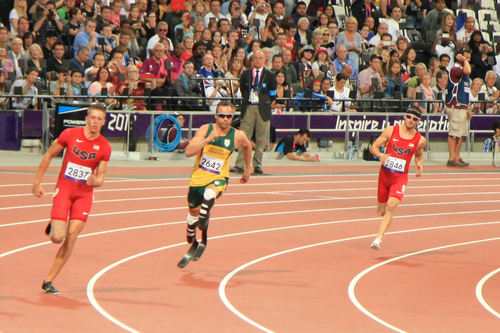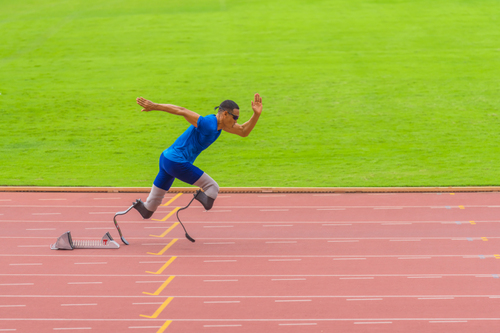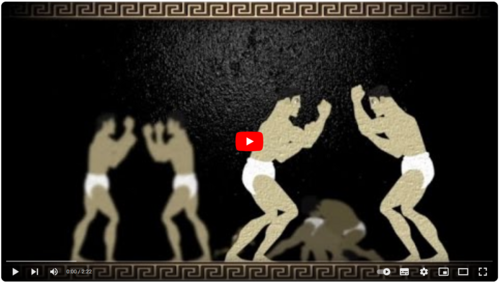How to republish
Read the original article and consult terms of republication.
Paralympic Games in the media: disability and its paradoxes
By Bertrand Quentin, Lecturer in philosophy at LIPHA laboratory, Université Gustave Eiffel.

Buoyed by the success of the Paris 2024 Olympic Games, the Paralympic Games kicked off on Wednesday 28 August and will run until 8 September. Since the Seoul Games in 1988, the Paralympic Games have been held in the same city, immediately after the “traditional” Olympic Games.
Decade after decade, we can be delighted with the growing visibility of these Games. Yet this raises paradoxes that deserve consideration: the paradox relating to the fact that the ancient Greeks would not have contemplated allowing disabled athletes to compete in the Olympic Games; the paradox of extreme media exposure, where the normalize of disability may otherwise have been sought through discretion; the paradox of inclusion that is never totally inclusive, and the paradox of performance achieved using equipment...
See also: Para-athletes: “Porn inspiration” and stereotypes: the difficulty in finding sponsors
Ancient Greece, disability and the Olympic Games
The Greeks were not prepared to accommodate disability. For people enamoured with a certain beauty of form and body, Greek statuary concentrated on Apollo, Zeus and Heracles with their harmonious, muscular and competitive bodies.
In the Games, founded in Olympia in 776 BC, (a date somewhat open to question), the various Greek cities competed in sports where strength and performance were key. At that time, it was unthinkable that a disabled person could participate and still have a chance of winning the wild olive wreath. Since the participating cities could gain considerable glory, there could be no risk entering contenders who would not have the best chances of winning.
In this respect, Sparta reigned supreme as the most consistent winner of the events. A mythical aura surrounds the elimination of children born with physical disabilities in Sparta: Plutarch is the only source to mention the practice of infanticide, while the Greek anthropologist Theodoros Pitsios concluded in 2007, after five years of excavation, that the Apothetes chasm along Mount Taygetos contained no children's bones, but mainly those of adults aged between 18 and 35 (probably prisoners of war, traitors or criminals). Whatever may be said about this frequently mentioned practice, it is clear that this was not a time for celebrating bodies that were deemed imperfect (which was also the case in Athens, as borne out by Plato's texts).
Therefore, the first modern paradox was to create Olympic Games that would also give space to the celebration of disabled people, on the altar of strength and performance.
Disability between visibility and invisibility
A second paradox now emerges. Disabled people may suffer from the way others look at them when their disability is visible. The English politician William Hay was born in 1695 with a deformed body. He was hunchbacked and short (1.52 m), with a face marked by smallpox, which seriously impaired his eyesight. Even though he belonged to the landed gentry, he still found it hard to bear how other people looked at him.
Hay stated that he was not overly concerned about how he was perceived by the aristocracy who is taught to recognise hierarchies but never to appear disconcerted in front of anyone. William Hay did fear large gatherings and crowds, however, claiming that his deformity would inevitably elicit insults and mockery.
Now imagine the battle that some Paralympic athletes have had to wage against the natural human temptation towards introversion: learning to keep out of sight to avoid being ostracised.
Hay wrote:
“I’m always uneasy when anyone looks stedfastly on so bad a picture, and cannot look with a proper confidence in the face of another. I have ever reproached myself with this weakness, but I m not able to correct it “ original [1754, p.54]
This makes it easier to understand the paradoxical nature of these Paralympic Games, which have become the focus of an overwhelming global passion: a billion eyes will be gazing at you through the cameras; a billion eyes will be analysing the nature of your disability, with the traditional alternation between seduction and repulsion
The Games are a show. You must not be afraid to step into the spotlight. The effects will vary from competitor to competitor, as the experience of last month's Olympic Games showed: some will be overwhelmed by the public pressure and produce disappointing performances, while others will thrive on the positive energy they receive.
Rejecting liminality
Disability issues receive relatively little media coverage. However, a number of highly successful films such as “Intouchables” (2011), “Hors Normes” (2019) and, more recently, “Un p'tit truc en plus” (2024) prove that physical, psychological or mental differences can encourage the general public to see disability in a positive light.
Nonetheless, disability is seldom represented on television, and the increased exposure provided by the Paralympic Games can only be welcomed. But if visibility is to be more than merely symbolic, it would be beneficial to recruit disabled journalists to cover the events.
This divide between the able-bodied and people with disabilities is maintained by the fact that television programmes covering the Paralympic Games have always been dominated by “able-bodied” sports journalists.
This illustrates the concept of liminality, referring to the fact of being “kept on the threshold” (“Limen” in Latin means the threshold). The original idea came from the French ethnologist Arnold Van Gennep, whose book “Rites of Passage”, published in 1909, described a situation, during a rite, in which an individual is isolated from the life of a group without being definitively rejected.
In the 1980s, the American anthropologist Robert Murphy took up the concept of “liminality” in relation to disability, stating that people with disabilities are kept on the fringes of society – neither totally outside (as we saw during the Nazi period) nor ever totally inside (an invisible barrier always prevents them from enjoying a “normal” life).
Very often, our societies only pretend to welcome disabled people, leaving them, in reality, in a state of liminality that sees people with disabilities being transformed into invalids, as illustrated by a poster indicating that a place is “exceptionally” inaccessible to disabled people because the lift has broken down. We must hope that the Paralympic Games will help to improve the acceptance of different bodies.
The paradox of performance using equipment
In any case, William Hay, whom we mentioned earlier, had ceased to dwell on the limitations of his physical performance and even claimed that they could be beneficial:
“As a deformed person is not formed for violent exercise, is less liable to such disorders as are the natural consequence of it. He will although escape many accidents, to which men of athletic make, and who glory in their strength, are always exposing themselves to make trial and proof of it” [original 1754, p.26]
All he could imagine for the disabled person was success as a writer : « He cannot be crowned at the Olympic Games ; but may be the Pindar to celebrate them » Original, [1754, p.27]. What has changed in modern times is the technical possibility of remedies, which could never have been imagined in William Hay's time, let alone in Antiquity.
Physical remedies enable individuals, even with all four limbs amputated, to walk with prostheses (or even run with carbon blades) and drive a vehicle, while digital remedies allow them to access the world via the Internet or a smartphone
But there are different sports, just as there are different disabilities. Consequently, performance cannot be interpreted in exactly the same way. Attaching a paraplegic tennis player's racquet to their arm by Velcro because their hands are atrophied does not give them an unreasonable technological advantage. In running and long jumping, however, technical devices have radically improved performance.
We all remember the two carbon prosthetic blades used by the South African athlete Pistorius, and the controversy surrounding the fact that he was able to benefit from an unfair competitive advantage, even against “able-bodied” athletes.

Credit : Epictura - Akesin - ID662086906
An initial question could deal with the difficulty of establishing fair competition if technical processes interfere with the use of a body's natural potential. The different levels of disability further complicate matters: can a fair distinction be made between the performance of one competitor who has only 25% motor strength in one thigh and another who has 35%? The various international federations are responsible for setting the competition standards within their sport and, as with all human practices, it is only over time that a consensus emerges, with certain sports being excluded from the Paralympic Games because it is impossible to ensure consistent levels of performance.
But aside from such questions, the fact that technical devices enable some disabled people to feel less constrained, and to derive joy from their bodies and from competition, can only delight us, mirroring the delight we feel whenever the Paralympic Games are given a higher profile and the number of participants in the various sports for the disabled rises. However, to accommodate these people, we also need more facilities and more time slots, as well as more coaches and trainers.
Identity card of the article
Original title: | Jeux paralympiques dans les médias : le handicap face à ses paradoxes |
Author: | Bertrand Quentin (Université Gustave Eiffel) |
Publisher: | The Conversation France |
Collection: | The Conversation France |
License: | This article is republished from The Conversation France under a Creative Commons license. Read the original article. An English version was created by Hancock & Hutton for Université Gustave Eiffel and was published by Reflexscience under the same license. |
Date: | September 4, 2024 |
Langages: | French and english |
Keywords: | Paris, Antiquity, disability, Paralympic Games, Ancient Greece, athletes, sporting events, 2024 Olympic Games |


![[Translate to English:] Licence creative commons BY-SA 4.0 [Translate to English:] Licence creative commons BY-SA 4.0](https://reflexscience.univ-gustave-eiffel.fr/fileadmin/ReflexScience/Accueil/Logos/CCbySA.png)